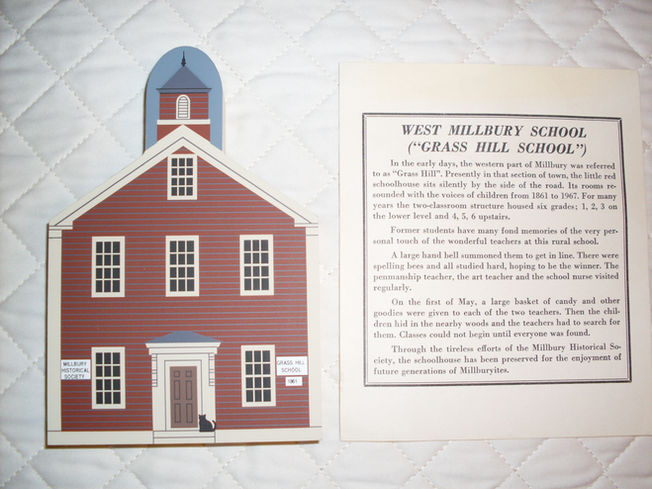Millbury: Gateway to the Blackstone Valley

P.O. Box 367
Millbury MA 01527
508-865-4192
MUSEUM STORE
Millbury
by Chris Sinacola
Images of America Series
Price: $21.99
128 pages/ softcover

History of Millbury Told Through Vintage Images
Local author pens new book on this Worcester
County town
The newest addition to Arcadia Publishing’s popular
Images of America series is Millbury from local author
Chris Sinacola. The book boasts more than 200
vintage images and memories of days gone by.
Located in the heart of the historic Blackstone Valley, Millbury has long
played a central role in America’s industrial and cultural history.
The town’s early history was shaped by the Nipmuc people.
In the 18th century, farmers pushing west found Millbury’s hills and
waterways perfect for farms and small industries. The opening of the
Blackstone Canal in 1828 allowed Millbury to market its wares to the
nation. The Waters family produced guns in Armory Village, and Asa
Waters II built his stately mansion downtown. Millbury inventors had a
hand in perfecting the lathe, thermometer, and telegraph.
By 1910, Millbury was an industrial powerhouse, producing shuttles for
the weaving industry, woolen goods, and the finest chisels and machine
tools in America. The mills, boasting over a century of innovation and
experience, drew investors and workers eager for a share of the
American dream.
Highlights of Millbury:
• Mill legacy
• Millbury Center
• Bramanville
• West Millbury
• School and society
• Church and home
The Millbury Historical Society proudly offers these quality items reflecting the history of the Town of Millbury at Board Member Gloria Schimke's antiques booth at Live Flea or Buy, 175 West Main Street.
Hours daily 10-4. Phone: 774-287-0104

Millbury Redware is created by Bullard House Pottery in Sutton by local artist Rachel A. Tufts.
All pieces are unique because they are hand-made and are inscribed with the date of Millbury’s
inception: 1813.
The following distinctive samples are offered for purchase exclusively through the Millbury Historical Society:
Mugs $20.
Plates $25.
Crocks $30.
Jugs $35.
OTHER ITEMS WE OFFER
(CLICK ON EACH IN THE CAROUSEL FOR DESCRIPTION/PRICE)
A Wonderful Donation! ($20)

If you're a fan of Millbury's genius inventor, Thomas Blanchard, then you're sure to approve of Carolyn C.
Cooper, PhD. and her generosity!
Her book, Shaping Invention: Thomas Blanchard's Machinery and Patent Management in 19th-Century
America appeared in 1991.
While emptying her office at Yale University in preparation to taking retirement, Dr. Cooper came upon twenty-two brand-new copies of her Blanchard tome and immediately thought of Millbury, Blanchard'sbirthplace.
She contacted The Millbury Historical Society and thoughtfully donated these remaining copies of
"Shaping Invention."
Thomas Blanchard was born on June 24th 1788, in Sutton (soon to be Millbury) Massachusetts. His first
invention was a tack-making machine which he invented at age eighteen and perfected over the next six
years. This made production of tacks, which Thomas and his brother had been previously engaged in
making, easier and more efficient at a rate of five-hundred per minute.
Soon he was working for Asa Waters, a major contractor in Millbury, producing flintlock muskets
supplementing those made at Springfield Armory. At Asa Water’s armory, Blanchard created his first
replicating machine, a lathe for uniformly cutting the exterior surface of musket barrels. Using a cam to
control the cutter, the final three inches of the breech was automatically formed partly flat-sided as in hand-
made barrels.
By 1818, the Springfield Armory had this machine in operation.
Legend has it that during one of Blanchard’s visits to the Springfield Armory at this time, a musket
stockmaker, who carved the wooden gun stock, was heard to express that a machine could not be
invented to replicate his skill at shaping wood.
In a short time, Blanchard realized that he could produce just such a machine. In 1819, he patented his
wood-turning lathe for cutting irregular forms.
Many thanks for your generous donation, Dr. Cooper! Your books have found a good home.
Happy retirement!












